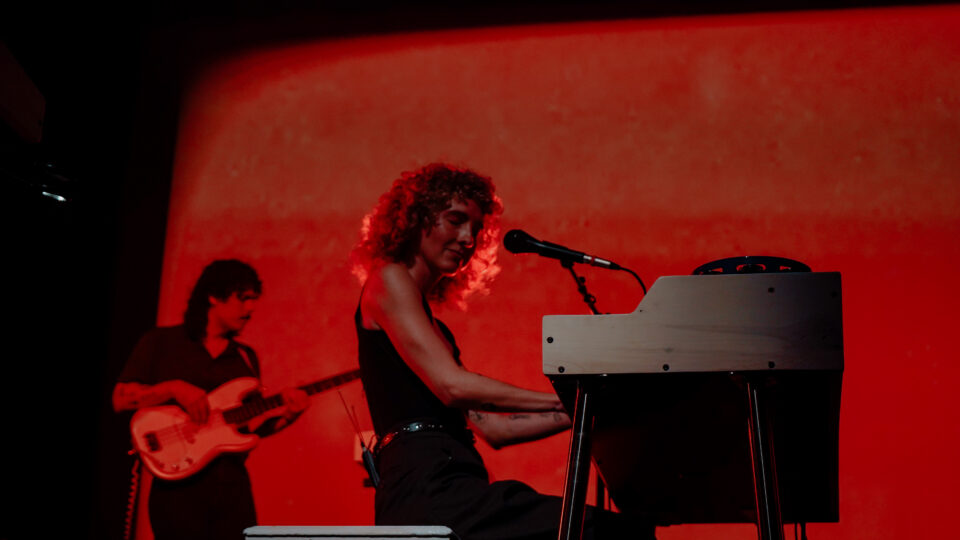Upon the evening of October 19th, as Thursday leads Iowa City to anticipate the coming weekend, Tennis, joined by Sam Evian, performed at The Englert Theater as part of the Track Zero series. Sam Evian, the show’s opener, began his set at 7:30 pm. He inaugurated the show with enigmatically funky sprawls of soft rock. Immediately, the audience got up from the seats of the theater, and made their way closer to the stage to get within reach of the sound of Evian’s band’s indulgently polyphonic melodies of richly dynamic rhythm. “Who needs chairs?” Evian expressed in between songs as he was impressed by how many of the audience had gotten up on their feet.
Who needs chairs indeed, when you’ve got psych pop to jive to? Soulful and fluidly shrill, with fuzz and reverb. Evian was able to exhibit his talent on many instruments. At points int the set, he played the electric guitar, the keyboard, and the saxophone all contained within different songs. As the guitar, stratospherically warm and feeble, whereas the bass and drum, textured with staccato downbeats. Evian’s set, which had most of its tracks derived from the 2021 album entitled Time to Melt, was one profuse with a refined inkling for what indie rock is when extracted from a place of unfeigned, cordial atonality.
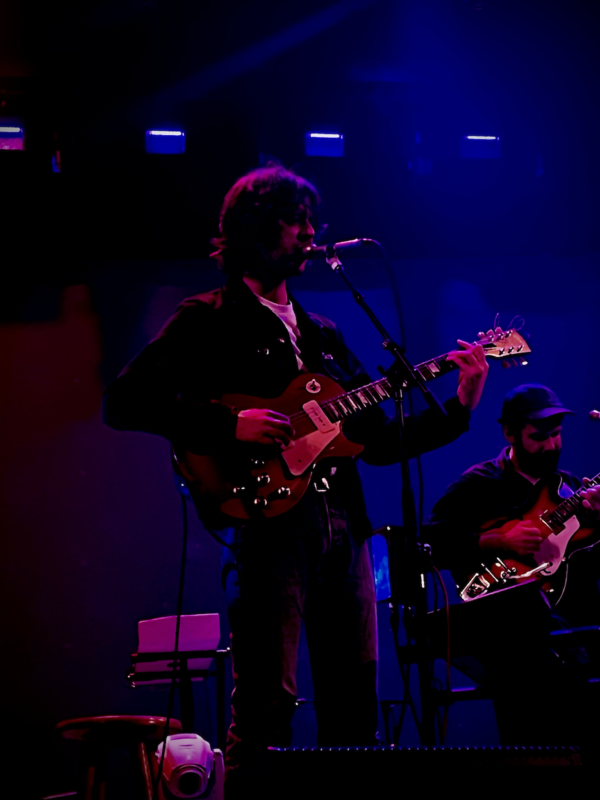
Image via Anika Maculangan
However, Evian’s stridently uplifting performance was then interrupted by disruption of the venue’s fire alarm, which forced the audience to evacuate the theater as a safety precaution. The audience, which had so far been enjoying Evian’s set, made their way out of the venue right in front of the entrance, where the fire department had soon shortly arrived to survey the building. With much luck, it was only a false alarm and there had been no actual fire. With this, the audience had then returned inside the venue, where Evian and his band had then carried on with their set.
They showered the crowd with crescendos of firm velocity, sprouted from their semblance, resonant to the Dunedin sound we all know of. A New York-based artist signed to Fat Possum Records, Evian has a coveted respect for the ’70s. What would be considered country and blues overlay on top of his already present strain of indie rock, bordering into folk. Furthermore, in Evian’s lyrical value, what we can gain is optimism for such things we may find hopeless, the light at the end of the tunnel, if it wasn’t such a banal thing to say.
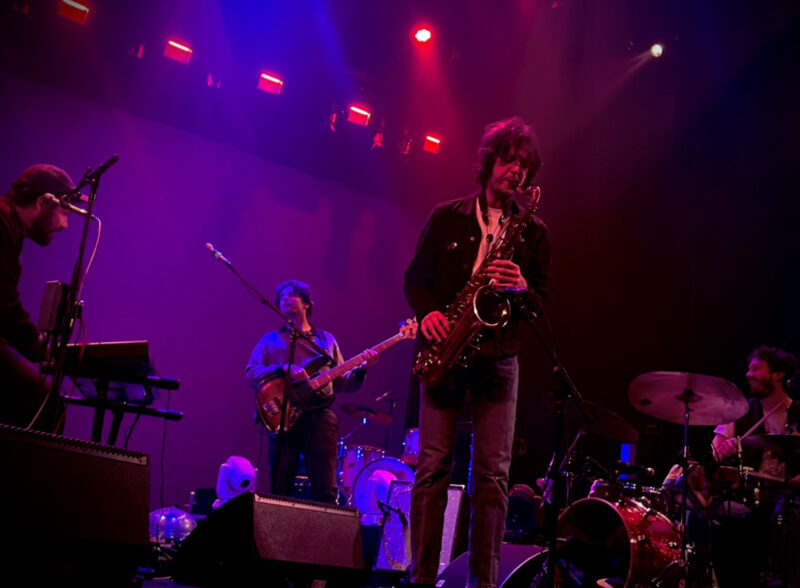
Image via Anika Maculangan
With tracks like “9.99 Free”, we witness a narrative that positions itself as a slice-of-life story, yet with filters that explicate life’s refined convolutions, however intricate and complex. Whereas in more tensely brittle songs like “Never Know”, we observe an anthem that bears its rawness and tinge for realism, as it constitutes itself as a pandemic lockdown project. It constitutes where one finds themselves brimming with uncertainty and doubt. What Evian achieves is to find thorns within roses, yet convene them into a bouquet, where the spikes don’t prick.
Finally, to end his set, Evian plays a cover of the celebrated Gerry Rafferty song called “Right Down the Line“, which as soon as its iconic, venerable guitar riff strikes and cuts through the draft, the audience is immediately thankful for Evian’s aurally loosened set, all appointed within his finely calibrated soundscape. With Evian’s set, we think of maraschino cherries, where in another dimension, are pleasantly bittersweet, as he successfully fuses crudely-allotted instrumentation with mildly sprung resonance.
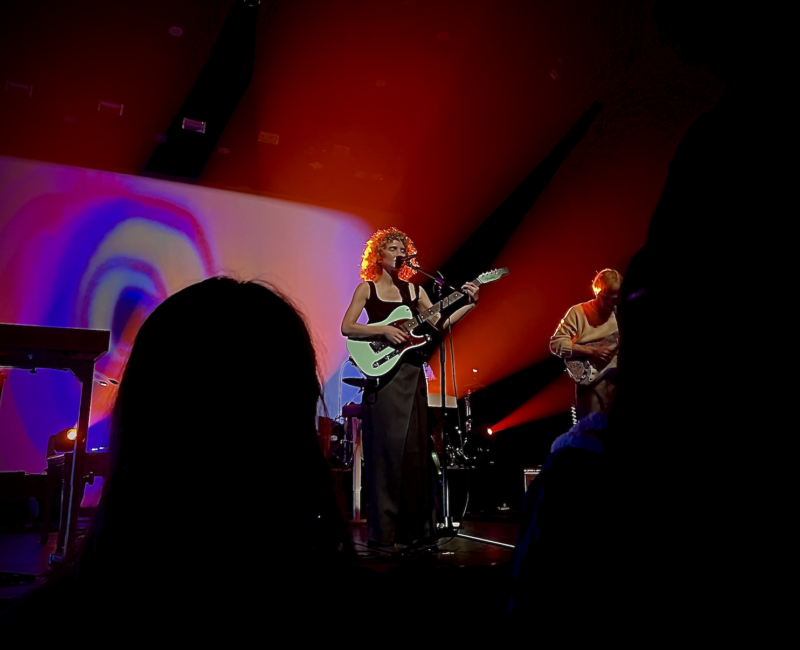
Image via Anika Maculangan
After a brief intermission, the lights go off again. As Tennis comes up on the stage’s platform, the surface is instantaneously pervaded with the blinkering of a disco ball, encompassed by prismatic strobe lights and projections of pigmented dye that seem to fizzle and bleed into one another. One can note that Tennis’ layout set-wise gave the illusion of an open living room’s format. There was something so free-flowing, flexible, and adaptable about it, like the band was just a traveling set that could play whenever, wherever. There were casual keyboards in place, surrounding Alaina Moore, the band’s lead vocalist, whereas multiple sets of guitars, both acoustic and electric, had been in position adjacent to Patrick Riley.
It was fascinating to see how multifaceted the pair was, in their convertible manner of being able to operate such protean machinery, run by the couple’s engine of love and respect for one another. The duo conjured a feel for makeshift improvisation in their set, as one song after the other had evoked a sense of innately instinctive musicality. Moore danced gingerly during some of the songs, cooly holding the mic with a relaxed dexterity. It had felt as if we were just watching Moore and Riley coexist through the windowed lens of Englert’s stage. Peeking in or glancing through, Tennis welcomed these wandering eyes into their life with open arms.

Image via Cat Dooley
How one might describe Tennis’ discography, is as a transportive portal that leads to a celestially astral seashore, where waves greet the sand with trance like syncopations of Moore’s choral vocals alongside synth lines, decayed and with long attacks and high sustain. The band played Tracks off their Pollen album, an amalgamation of uplifting and more indulgently insouciant songs, creating a weaved tapestry of the ethereal and the gallantly stirring.
Lyrically, Tennis on tracks like “One Night with the Valet”, and “Let’s Make a Mistake Tonight”, implore themes of lighthearted, carefree existence, whilst being attentive to the world’s paced flow into progression and succession. This is at which one learns to embrace these fluctuating shifts in a backdrop where heaven and the universe blur into one another. What Tennis amplifies is the silver lining of every cloud to be confronted, at which their inclination toward surf pop and yacht rock simultaneously deliver callings of the ocean and the sea.
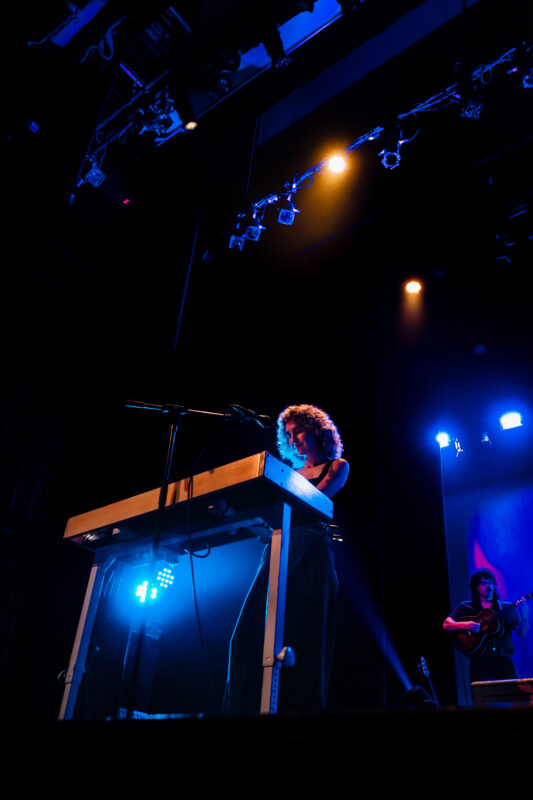
Image via Cat Dooley
Midway through the set, Alaina touches base with the crowd as she plays the game of guessing everyone’s majors. She denotes how fun it is to stage a show at a college town. She also tells the humble tale of how in 2010, the band had played a Des Moines show at Vaudeville Mews, where they had stayed with a member’s aunt and uncle. They had been their biggest supportive fans at that time at that particular show.
Something to observe is that Tennis doesn’t shy away from its past. Even musically, they play tracks from previous releases such as “My Better Self” off the 2013 album Young and Old. Some songs off the 2020 album Swimmer were also played, at which tracks like “How to Forgive” and “Runner”, remind us of the band’s affinity for synth-pop. To then close the show, the duo had played “Late Night“, where Moore had told the crowd that they would now be singing the audience to sleep. On guitars, Moore played on a mild acoustic, while Riley complimented this with demure strummings of an electric. The two had let out a lullaby before the night had come to its eventual end.
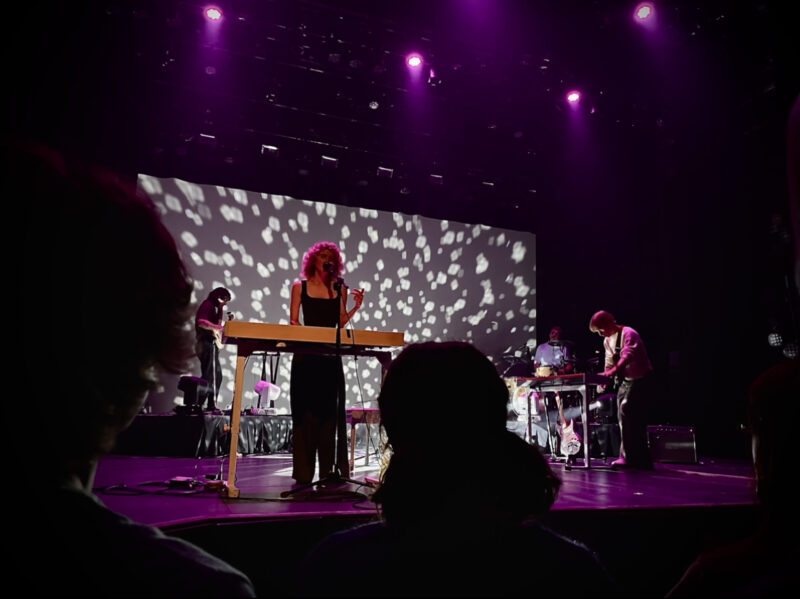
Image via Anika Maculangan
Tennis’ display of drifting, vagrant sound had led the crowd to be suspended in the air. In a levitated state brought upon by their hazed tonality, it fades into an electronically-induced unification of what is retro and vintage. A rejuvenated revitalization of a stylistic sound buried far too long below the nu-pop stratum. Tennis is the calm after the storm that pushes for a rainbow upon exit.
Track Zero continues with Sen Morimoto on November 11th, and ZORA on November 17th. You can read KRUI’s interview with Tennis’ Alaina Moore here.

